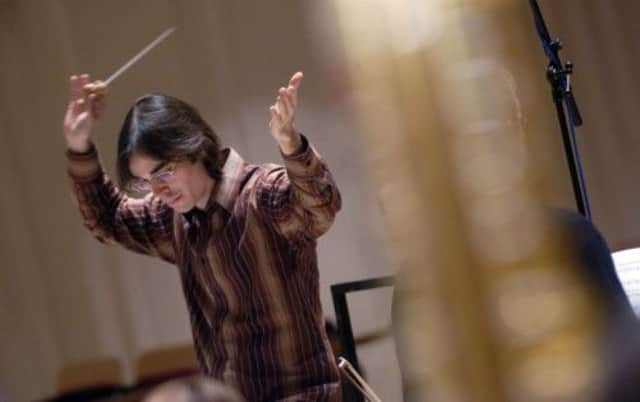Ilan Volkov is back in Scotland with Tectonics


But these days, he’s freer than ever to indulge his feverishly fertile mind in crazy musical capers that range from last year’s solo performance at the BBC Proms of John Cage’s Child of Tree on a set of amplified cacti, to part-ownership with jazz musician Assif Tsahar of the avant-garde club venue Levontine 7 in his native Israel, to a radical new festival brand he calls Tectonics.
The last of these sparked into life last year in Reykjavik, arising from Volkov’s directorship of the Icelandic Symphony Orchestra, and further inspired by the orchestra’s magnificent new hall. Next weekend (10-11 May), again under Volkov’s direction, but with the SSO as the primary orchestral vehicle, the first Tectonics Glasgow will be presented in the City Halls complex.
Advertisement
Hide AdThe question Volkov asked himself when creating his first Icelandic Tectonics was this: “How can an orchestra, a 19th-century beast, be more radical and experimental?” Whatever the answer turned out to be, he said, it had to be an adventure for everyone – the composers, the performers and the audiences.
As for the name itself, everyone in Iceland is familiar with the geological fragility arising out of tectonic shifts. “So yes, it was a name that connected with people in Iceland. But more generally it’s about all that pulling and shoving going on as artists look for new modes of expression, or it could just be the struggle of creating something new,” Volkov explains.
The Tectonics Glasgow programme is mouth-watering in its boldness, its intellectual challenge and its distinctive originality. There are five major orchestral world premieres – three commissioned by the BBC – which use the orchestra, rather in the Boulezian concept, as a flexible resource to be reshaped and resized in a multitude of ways.
What this is not, says Volkov, is a celebrity-fired festival. “For me, it is important not to have big names. There’s no point in doing something like yet another Steve Reich festival. That’s just like doing Beethoven’s complete symphonies again. What I’m interested in here are the possibilities of different voices coming together and how they connect.”
It was also important to Volkov that Glasgow-based artists were part of the line-up, reflected in the three BBC commissions that have gone to Scots or Scots-based composers. So David Fennessey’s Prelude (Silver are the tears of the moon) kicks off the entire event as the first work in the opening concert on Saturday; Martin Suckling’s Release features in Sunday’s Orchestral Concert 2; while John De Simone’s Geek forms part of the closing concert later on Sunday night.
Being Volkov’s baby, was he tempted to have a say in how the composers set about their tasks? “I did have a meeting with all three, and basically said, ‘Do something quite radical’. I even said to them they didn’t have to use the whole orchestra, but in the end, all three did. I suppose it’s understandable they’d want to go for the jugular and write for the whole machine.”
Advertisement
Hide AdHe was, however, insistent on several issues. “The works should have a Utopian element, and I told them not to worry about the practicalities of performance; that we would sort all that out,” he says. And he’s delighted with the results: “The composers have explored three very different directions, even if some of the influences are similar.”
There is one big avant-garde name whose music will run as a thread throughout the first Tectonics Glasgow Festival. He is Alvin Lucier, the 82-year-old American composer and performance artist who, influenced by John Cage, has pioneered such esoteric areas as the use of brain waves in live performance and the use of room acoustics in shaping the outcome of musical creativity, as well as his formative experience working with electronic composition.
Advertisement
Hide AdWe won’t hear his seminal work, I am sitting in a room, which takes a poetry reading, records it in one room, records the recording in another room, then repeats the process over and over until the multiple acoustics transform the words into elusive musical sound. But we will hear, in the opening concert, the UK premiere of The Exploration of the House, an orchestral manifestation of that earlier work.
“I first got into Alvin’s work five years ago,” says Volkov. “He grew out of that American school of composers of the 1960s who were influenced by Cage, but went his own very different way, principally as a member of the experimental performance collective, Sonic Arts Union.”
And like Cage, his creative thoughts extend way out of the box. Take his Installation Music for pure waves, bass drums and acoustic pendulums, which will be set up in the Recital Room, and requires amplified sound waves to create vibrations in the bass drums, which in turn set in motion suspended ping pong balls which then pick out rhythms on the drums. As the environmental conditions affect the drumhead tensions, the resulting sounds and rhythms will alter throughout the two days.
Apart from Lucier’s work, Tectonics Glasgow features the soft atmospherics of Morton Feldman’s music, the nature sounds of Finnish vocalist Hanna Tuulikki, world premieres from Romanian husband and wife composers Iancu Dumitrescu and Ana-Maria Avram, the powerful electric guitar playing of Stephen O’Malley, and much more.
For Volkov, Tectonics has become a highly exportable phenomenon. He’s happy to take it anywhere he can find the right partners, and Adelaide is already on the cards for next year. But meantime the focus is on Glasgow, and a festival that promises to blow our minds in ways we probably couldn’t imagine.
• Tectonics Glasgow is at the City Halls, Glasgow, from 11-12 May, www.bbc.co.uk/bbcsso